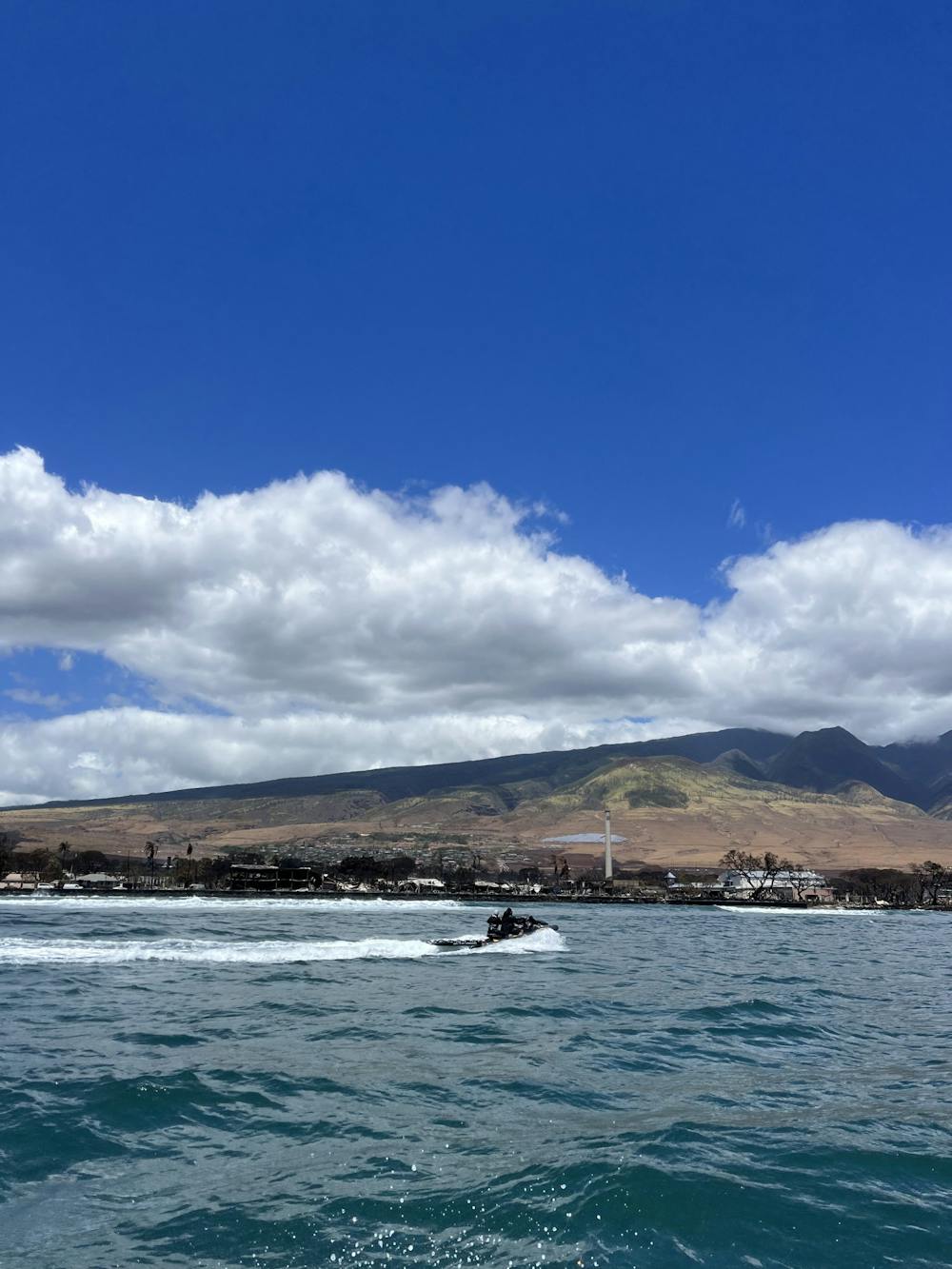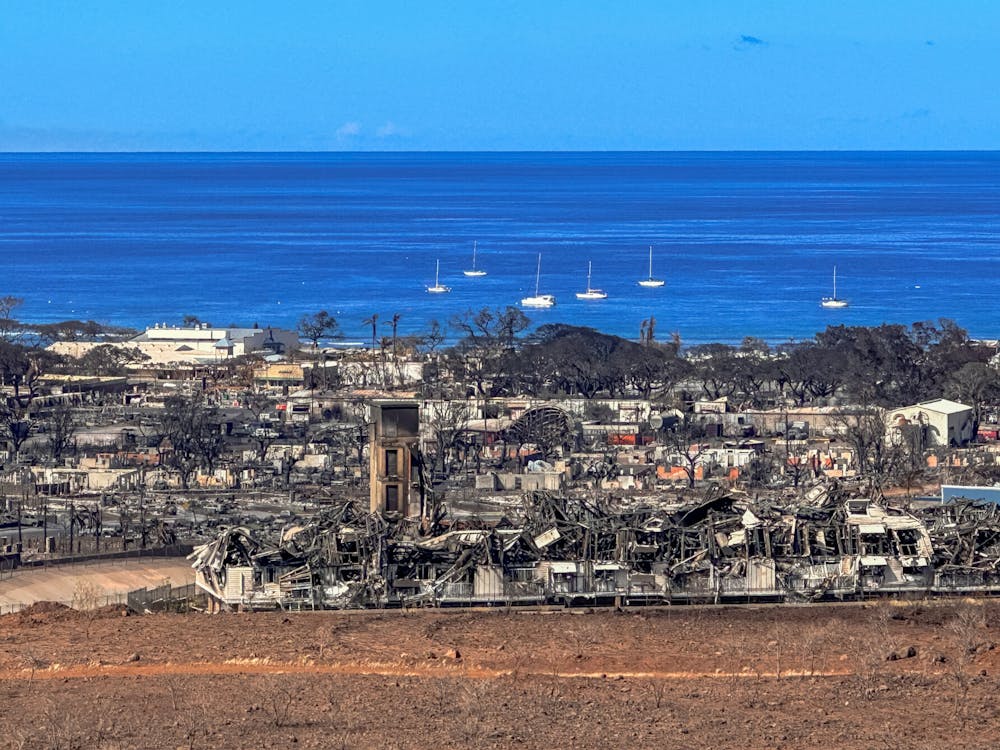Awoken by a frantic phone call from her friend, Mileina Sniffen’s seemingly normal Thursday morning quickly turned into a day filled with fear, confusion and uncertainty. The words ‘are you okay’ woke up her groggy self and as prompted by her friend, Sniffen looked out her window to see the sky overtaken by an orangey-brown haze.
From Makawao, Hawai'i, on the island of Maui, Sniffen’s family is one of many that anxiously waited at home that day at the chance they were told to evacuate due to the power line fire that allegedly started the deadly flurry of fires in Lahaina on Aug. 8.
Recent reports indicate the fires killed at least 97 people, and more than two dozen are missing or unaccounted for. Many survivors had to leave their homes and are still struggling to rebuild their lives. The fires lasted up to Aug. 11 and damaged over 2,200 buildings in Lahaina alone according to CNN.
Sniffen recalls that the night before she had noticed how windy it was. If she and her family had to evacuate at that moment, they would not have been prepared.
“That morning, we were all living our lives like it was just a normal day,” Sniffen said. “The one thing that I know I wouldn’t be able to do was leave that house without getting my animals. One of our cats just had a litter — we just weren’t ready.”
Fortunately, Sniffen’s family has not been directly affected by the fires. But the loss of resources and business on the island has impacted her father’s work as a mechanic.
“The business hasn’t been as good,” she said. “But that’s like an indirect effect from it. If my family was directly affected I probably wouldn’t be doing a semester here.”
Inflicted by a whirlwind of emotions, Sniffen reluctantly flew back to Portland 10 days after the fires started. Joining her was the weight of guilt from having to leave her loved ones behind.
A junior psychology major, Sniffen had to get herself back into the school mindset after seeing the island she grew up on suffer from the repercussions from the fires.
“It’s been pretty hard right now because there’s this form of guilt,” Sniffen said. “Like you’re leaving something behind. But yeah, there is this form of guilt coming here.”

Junior Nohealani Ledesma resonates with that feeling of guilt from having to come back to school only a week and a half after the fires hit Lahaina.
From North Shore in Maui, Ledesma did everything she could to support those in Lahaina. A nursing major, she volunteered at War Memorial Stadium as a student nurse as they were “severely understaffed with medical personnel” according to Ledesma.
“I felt guilty because I was one of the fortunate people, but I used that guilt in a way to help the people and I felt relieved when I saw the people's faces when we brought them all of this stuff,” Ledesma said. “They were crying of joy because they hadn't received the things that they needed.”
While it isn't her immediate home, Ledesma frequented Lahaina often when visiting family and friends. When she first saw the damage from the fires, the scene was indescribable.
“We saw firsthand what everybody was going through and struggling with,” she said. “We passed by Front Street, the infamous Front Street, and it was really devastating. Like I’ve seen pictures and videos, but being there, it was unrecognizable.
Social media played a huge role in getting the word out about collecting donations for those in need. UP’s very own Hawai'i club compiled a list of donation locations all around Hawai'i and Oregon.
But while an abundance of donations were collected, there was trouble trying to disperse them out to people in need. The government closed down the one road that led to Lahaina which prompted Maui residents to get creative in distributing their donations.
“We were literally hiding from the Coast Guard, trying to bring all of these materials to them,” Ledesma said. “Basic necessities, like water, clothes, food. There was a lot of sadness and our hearts are absolutely broken, but to see our community come together, and the fact that other islands are coming over on boats and planes to help us is incredible.”

Sniffen also spent her last few days at home volunteering at various shelters and the Hawai'i Humane Society. Stories about survivors clinging onto rocks in the ocean to stay afloat were the conversations surrounding her volunteering
“I didn't feel like I was doing enough because I was just serving coffee from 10 a.m. to 2 p.m. but I heard a lot of stories from the people there,” Sniffen said. “They just wanted to talk. They just wanted someone to listen. I’m sure they still have some trauma but I think at that point, they just wanted to share their stories.”
And there are still many stories to share.
Junior English major Annika Stammberger lives only 30 minutes away from Lahaina and notices the decrease in media coverage about the aftermath of the fires.
She expressed that for the people of Maui, it’s not over and it won’t be for a while.
“It’s still happening,” Stammberger said. “It’s still going on. These people have lost their homes and are still living in a shelter. They still haven’t found their loved ones.”
Sniffen too wants the UP community to know that just because the fires are over, the repercussions have had lasting impacts on the island.
“It’s not a sprint, it’s going to be a marathon,” she said. “I’ve heard that quote from a lot of the residents who lost their homes in Lahaina. The help that everyone has put into Lahaina is incredible but it needs to be maintained for the next couple years.”
Janea Melido is News and Managing editor of The Beacon. She can be reached at melido24@up.edu.








